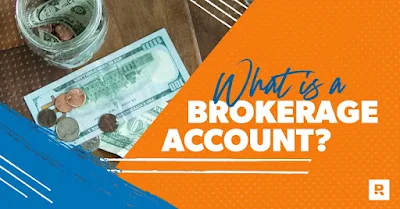Types of Brokerage Accounts: Which One is Right for You?
If you're looking to invest in the stock market, you'll need a brokerage account. But with so many different types of accounts available, it can be overwhelming to choose the right one for your needs.
Learn about the different types of brokerage accounts and which one may be best suited for your investment goals.
You may be familiar with savings and even investment bank accounts to let your money grow with low interest, but did you know that if you want to make your money work and invest in stocks you may have the option of opening a brokerage account ?
what's brokerage account
It is a financial account that is opened with an investment firm. NerdWallet differentiates these types of accounts from bank accounts in that they offer access to a variety of investments, including stocks, bonds, and mutual funds.
Brokerage accounts are also called taxable accounts, because investment income within a brokerage account is taxed as a capital gain, on which tax must be paid.
How do brokerage accounts work?
Some licensed brokerages, from more expensive full-service brokerages to low-fee online discount brokerages, can set up a brokerage account.
There are brokers that allow you to open a brokerage account quickly online and usually you don't need a lot of money to do it, there are even the options where you don't even need an initial deposit. However, you will need to fund the account before you buy investments, either by transferring money or by mailing a check.
The dynamic works by means that your money and the investments you make are made through your brokerage account, where you can sell investments at any time. The advantage is that the broker who manages your account maintains it and acts as an intermediary between you and the investments you want to buy, even having advice from your administrator on whether or not it is convenient for you to make the investment.
For those people who want to start in the world of investments but do not know how to take the first step, these accounts can be the beginning of a future of purchases and sales of various kinds that will yield you money.
Types of Brokerage Accounts
Cash Accounts: The Basics.
A cash account is the most basic type of brokerage account. With a cash account, you can only buy securities with the cash you have in the account. You cannot borrow money or trade on margin.
This type of account is best suited for investors who are just starting out and want to make small, infrequent trades.
It's also a good option for those who want to avoid the risks associated with margin trading. However, keep in mind that cash accounts may have limitations on the number of trades you can make per day or per week.
Margin Accounts: What You Need to Know.
Margin accounts are a type of brokerage account that allows investors to borrow money from their broker to buy securities.
This means that you can buy more securities than you could with just the cash in your account.
However, margin trading also comes with increased risk. If the value of your securities drops below a certain level, you may be required to deposit more cash or securities into your account to meet the margin call. Margin accounts are best suited for experienced investors who are comfortable taking on more risk in pursuit of higher returns. It's important to carefully consider your investment goals and risk tolerance before opening a margin account.
Retirement Accounts: Planning for the Future.
Retirement accounts are a type of brokerage account that are specifically designed to help individuals save for retirement.
There are several types of retirement accounts, including traditional IRAs, Roth IRAs, and 401(k)s.
Each type of account has its own unique features and benefits, so it's important to carefully consider which one is right for your retirement goals. Traditional IRAs and 401(k)s offer tax-deferred growth, meaning you won't pay taxes on your contributions or earnings until you withdraw the money in retirement. Roth IRAs, on the other hand, offer tax-free growth, meaning you won't pay taxes on your contributions or earnings at all, as long as you meet certain requirements. Consult with a financial advisor to determine which retirement account is best for you.
Managed Accounts: Leave it to the Pros.
Managed accounts are a type of brokerage account where a professional money manager makes investment decisions on behalf of the account holder.
This can be a good option for individuals who don't have the time, knowledge, or desire to manage their own investments.
Managed accounts can also provide diversification and potentially higher returns than self-managed accounts. However, they often come with higher fees and may not align with the account holder's specific investment goals or risk tolerance. It's important to carefully research and choose a reputable money manager if you decide to go with a managed account.
Choosing the Right Brokerage Account for You.
When it comes to choosing the right brokerage account for your investment goals, it's important to consider factors such as your risk tolerance, investment experience, and financial goals.
Cash accounts are a good option for those who want to keep their investments simple and low-risk, while margin accounts allow for more advanced trading strategies
Self-directed accounts give you full control over your investments, while managed accounts provide professional management for those who don't have the time or expertise to manage their own investments. Consider your options carefully and choose the account that best aligns with your investment goals and preferences.


.png)
0 Comments